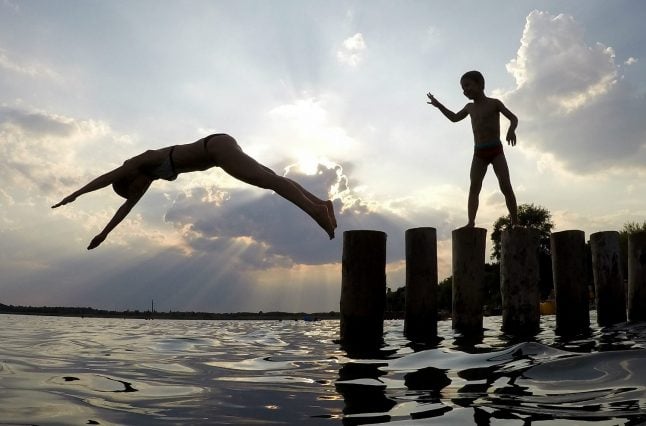Setting aside for a moment the worrying reasons that Germany, and many other countries, are experiencing extreme weather such as heat waves, let’s consider some of the positive things it brought.
I, for one, am going to miss all the Eis. Of course, you can have ice cream at any time or any day of the year if that’s your thing.
But was there anything better than scoffing a zwei Kugeln (two scoops) cone or a shop-bought fruity ice lolly, or indeed anything else that was full of sugar and freezing cold in these soaring temperatures? I think not.
During the height of the hot weather, when the temperature had already crept up to 32C before midday, it became the norm to eat an ice cream for lunch then have another later on.
To be honest, I can’t think of another time when it’s socially acceptable to eat a Magnum at 10am. A woman buying an ice cream in Niedersachsen in the north of Germany this summer. Photo: DPA
A woman buying an ice cream in Niedersachsen in the north of Germany this summer. Photo: DPA
Yes, it made sleeping virtually impossible at times, such as when Berlin experienced its hottest night ever at the end of July.
But when faced with these god-awful temperatures, Germans made the most of it.
There was never an excuse to stay in: parks were packed out, barbecues were made, light nights were enjoyed.
Trying to buy a cooling fan became a national sport, as did the quest to find air-conditioned spots. I found the best relief from the heat, short of moving into my fridge permanently, was to wrap a tea towel round a pack of frozen peas and keep it beside me at all times.
I’ll always look back fondly to the night that the blood moon made a rare appearance to the world. That evening I was in Tempelhof, the former airfield in Berlin. It felt like the whole city was there, gathered on picnic blankets or fold-up chairs, with a Radler and snacks in hand.
Similarly, at the lakes there were almost no spots as beach-goers clambered for a swim when Feierabend arrived.
Here’s another reason why I think summer 2018 was particularly great: the World Cup. Aha, I hear you say, Germany crashed out of the competition, what’s so good about that?
Well, maybe it’s because I’m Scottish and I can’t even remember the last time we managed to get a team into the competition, but I thought it was great to cheer on Deutschland even if it was only for a short time.
To watch a country pull together; flying flags from their cars or organizing parties to watch the matches, was amazing to experience.
Towns and cities across Germany became public living rooms. I couldn’t believe it when I saw TVs taped onto lamp posts outside Spätis, takeaways and restaurants as guests watched the games.
People flooded into “public viewing” areas guzzling down beer and singing: “‘Schland, ‘Schland!” It softened everyone and made people feel part of something.
I think – whisper it – I even witnessed some banter between people in shops and on public transport. Germans aren’t so into small talk compared to, say, the Brits or Americans, but the sporting competition brought out a side that made people want to engage and have a laugh with each other more.
So it was inevitable that Germany’s World Cup failure would be a hard pill to swallow. However, the German media seemed to be overly dramatic, viewing it as some kind of symbol for how bad things were. “Germany in Crisis: once upon a time there was a strong country,” said a headline in Der Spiegel. The story went on to analyze the precarious position of the team and the nation it represented.
I mean, calm down! Things aren’t that bad! Even if the tournament didn’t see a German victory, it was still a special moment.
 Disappointed fans in Berlin
Disappointed fans in Berlin
Although the Germany flags were swiftly packed away, I was delighted to find the country still enjoyed the rest of the World Cup, showing all the games on the same TVs and fostering the same welcoming atmosphere.
What can’t be ignored is the effect the hot weather had on the country. It caused a record drought that wreaked havoc on crops, sparking a national crisis for farmers.
What is encouraging to see during extreme weather, though, is that people seem to be a bit more connected. I think I spoke to my neighbours more this summer than I had the whole previous year. It's good to check in on each other when you're dealing with schreckliche Hitze – the terrible heat.
It’s only my second summer in Germany after last year's complete washout. So perhaps you can understand why I have rose-tinted spectacles on as I look back on this year's sunny days.
But with the deluge of bad news around, maybe it's not such a bad thing to make the most of the summer while it's here. And the ice cream, too.



 Please whitelist us to continue reading.
Please whitelist us to continue reading.
Member comments